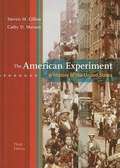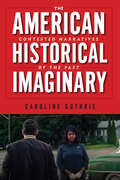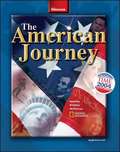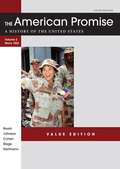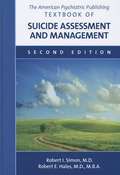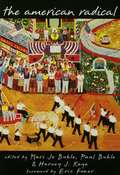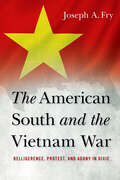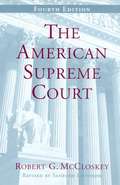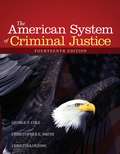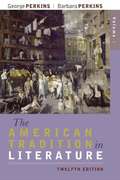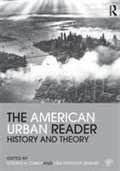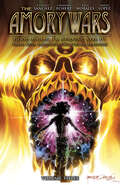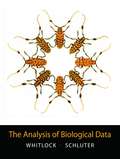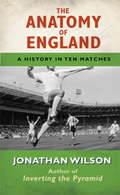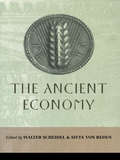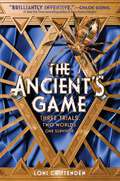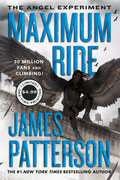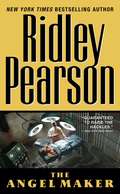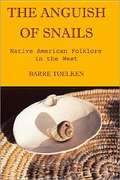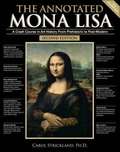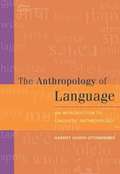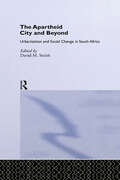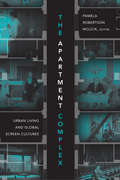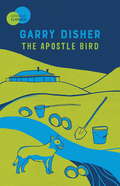- Table View
- List View
The American Experiment: A History of the United States
by Steven M. Gillon Cathy D. MatsonApproaching the American history survey course in an innovative way, this mid-length text features a more expansive definition of political history that includes all forms of politics, not just electoral politics, while simultaneously incorporating cultural history. With the specific aim of expanding history beyond elite actors, The American Experiment emphasizes everyday work, family life, customs, and objects of cultural history to address its four themes: the role of government, American identity, the broad concept of "culture," and America and the world. The Third Edition features an enhanced thematic approach that helps students understand America's development as an experiment in politics, culture, and identity, within a global context.
The American Historical Imaginary: Contested Narratives of the Past
by Caroline GuthrieIn The American Historical Imaginary: Contested Narratives of the Past in Mass Culture Caroline Guthrie examines the American relationship to versions of the past that are known to be untrue and asks why do these myths persist, and why do so many people hold them so dear? To answer these questions, she examines popular sites where fictional versions of history are formed, played through, and solidified. From television’s reality show winners and time travelers, to the Magic Kingdom in Walt Disney World, to the movies of Quentin Tarantino, this book examines how mass culture imagines and reimagines the most controversial and painful parts of American history. In doing so, Guthrie explores how contemporary ideas of national identity are tied to particular versions of history that valorize white masculinity and ignores oppression and resistance. Through her explanation and analysis of what she calls the historical imaginary, Guthrie offers new ways of attempting to combat harmful myths of the past through the imaginative engagements they have dominated for so long.
The American Journey
by Mcgraw-Hill StaffThe complete story of American history in one comprehensive middle school program The American Journeyis a student-friendly presentation of American history from pre-exploration to the present. Its unparalleled author team, including National Geographic, ensures accuracy in every detail of the narrative, maps, and charts. This program emphasizes skill development--from reading maps to analyzing primary and secondary sources to exploring the connections between history and geography, economics, government, citizenship, and current events.
The American Promise: A History of the United States Volume 2 From 1865 5th Edition
by James L. Roark Michael P. Johnson Patricia Cline Cohen Sarah Stage Susan M. HartmannAmerican History textbook
The American Psychiatric Publishing Textbook of Suicide Assessment and Management
by Robert I. Simon Robert E. HalesThe second edition of The American Psychiatric Publishing Textbook of Suicide Assessment and Management has been extensively updated and expanded to more thoroughly reflect the challenges clinicians face in assessing and managing suicide risk -- and ultimately in preventing tragedy. The number of chapters has been increased approximately 20%, from 28 to 34. In addition, 22 new chapter authors were recruited for the second edition, representing nearly half of the 50 authors from the first edition, to allow the reader to obtain a more varied and sometimes new point of view.
The American Radical
by Paul Buhle Harvey J. Kaye Mary Jo BuhleThe American Radical tells the story of American democracy from the late 18th century to the present through the lives of the women and men who have fought to advance it.
The American South and the Vietnam War: Belligerence, Protest, and Agony in Dixie (Studies In Conflict, Diplomacy, And Peace Ser.)
by Joseph A. FryTo fully comprehend the Vietnam War, it is essential to understand the central role that southerners played in the nation's commitment to the war, in the conflict's duration, and in the fighting itself. President Lyndon B. Johnson of Texas and Secretary o
The American Supreme Court (4th edition)
by Robert G. Mccloskey Sanford LevinsonIn this fourth edition, Sanford Levinson extends McCloskey's magisterial treatment to address the Court's most recent decisions, including its controversial ruling in Bush v. Gore and its expansion of sexual privacy in Lawrence v. Texas.
The American System of Criminal Justice, Fourteenth Edition
by George F. Cole Christopher E. Smith Christina DejongThis classic best seller examines criminal justice across several disciplines, presenting elements from criminology, sociology, law, history, psychology, and political science. Broad coverage of the facts, uncompromising scholarship, an engaging writing style, and compelling delivery of current events make THE AMERICAN SYSTEM OF CRIMINAL JUSTICE, now in its 14th Edition, one of the best books available for an in-depth look at the American criminal justice system.
The American Tradition in Literature: Volume 2 (12th Edition)
by George Perkins Barbara Perkins James Phelan Elizabeth RenkerIn this twelfth edition, The American Tradition in Literature extends fifty years of leadership into a second half-century.
The American Urban Reader: History and Theory
by Steven H. Corey Lisa Krissoff BoehmThe American Urban Reader brings together the most exciting work on the evolution of the American city, from colonial settlement and western expansion to post-industrial cities and the growth of the suburbs. Each of the chronologically and thematically organized chapters includes thoughtfully selected scholarly essays from historians, social scientists and journalists, which are supplemented by relevant primary documents that offer more nuanced perspectives and convey the diversity and interdisciplinary nature of the study of the urban condition.
The Amory Wars: Good Apollo, I'm Burning Star IV Vol. 3 (The Amory Wars #3)
by Claudio Sanchez Chondra EchertThe final chapter begins as the Rebel Army begins their assault on Apity Prime and Claudio and Ambellina find themselves face-to-face with Wilhelm Ryan, while the great battle outside Kalline is in full bloom, Inferno and Mayo meeting face-to-face on the battlefield. Writers Claudio Sanchez (COHEED & CAMBRIA) and Chondra Echert (Translucid) team with illustrator Rage Morales (Avengers) to conclude the latest chapter in the epic AMORY WARS saga.
The Analysis of Biological Data: From Mind to Molecules
by Dolph Schluter Michael WhitlockThe Analysis of Biological Data is a new approach to teaching introductory statistics to biology students. To reach this unique audience, Whitlock and Schluter motivate learning with interesting biological and medical examples; they emphasize intuitive understanding; and they focus on real data. The book covers basic topics in introductory statistics, including graphs, confidence intervals, hypothesis testing, comparison of means, regression, and designing experiments. It also introduces the principles behind such modern topics as likelihood, linear models, meta-analysis and computer-intensive methods. Instructors and students consistently praise the book's clear and engaging writing, strong visualization techniques, and its variety of fascinating and relevant biological examples.
The Anatomy of England: A History in Ten Matches
by Jonathan WilsonHaving invented the game, everything that has followed for England and its national football team has been something of an anticlimax. There was, of course, the golden summer of 1966, and the great period of English dominance on the world stage, which fell roughly between 1886 and 1900, when England won 35 of their 40 internationals ... But before long foreign teams, with their insistence on progressive 'tactics', began to pose a few questions. And much of what followed for England constituted a series of false dawns.In THE ANATOMY OF ENGLAND Jonathan Wilson seeks to place the bright spots in context. Time and again, progressive coaches have been spurned by England - technique being all very well, but what really matters is pluck and 'organised muscularity', or, to quote Jimmy Hogan's chairman at Aston Villa in 1936: 'I've no time for these theories about football. Just get the ball in the bloody net.'Wilson takes ten key England fixtures and explores how what actually happened on the pitch shaped the future of the English game. Bursting with insight and critical detail, yet imbued with a wry affection, this is a history of England like none before.
The Anatomy of a Lawsuit (Revised Edition)
by Peter N. SimonThis book is the story of a lawsuit between two friends. This book will trace their lawsuit from the accident through the pretrial procedures, the trial, and the appellate courts.
The Ancient Economy (Edinburgh Readings On The Ancient World Ser.)
by Walter Scheidel Sitta von RedenThe Ancient Economy introduces readers to the nature of economic life in the ancient world, and provides a valuable guide to scholarly debates on the subject. The book describes and examines the economic processes and fluctuations of the ancient world, and shows how these relate to political and social change and conditions. Leading experts address the central issues, from agricultural production to the uses of money and the creation of markets. Taken as a whole the book exemplifies the range of interdisciplinary perspectives on the ancient economy, and illustrates the methodological approaches scholars have deployed to understand it. In doing so it draws on literary, ecological and archaeological evidence.
The Ancient's Game
by Loni Crittenden"Brilliantly inventive." —Chloe Gong, #1 New York Times bestselling author of These Violent Delights"Gorgeously written and unforgettable." —Kamilah Cole, indie bestselling author of So Let Them BurnAlchemy and ancient spirits come to life in this debut fantasy inspired by African diasporic folklore and the 1920s World Fair, wherein sixteen-year-old Kellan DuCuivre, an orphan from a reviled class, must compete for a coveted apprenticeship among the nation’s elite in order to save her adoptive father from a twisted fate.Sixteen-year-old Kellan DuCuivre is the descendant of traitors. She never knew her family members or which one of them betrayed the isle of Nanseau. But like all Du orphaned after the war, Kellan is forbidden by law from practicing makecraft, the trade of carving magic into metal that was perfected by the Guild of Engineers and their maker apprentices. No one can know that Kellan has been using makecraft in secret and that, in the wake of a tragic miscarve, she’s been helping her adoptive father, Edgar, run his celebrated makeshop.But Edgar’s condition is worsening, and his shop is on the brink of ruin. On the eve of the Eighty-Fourth Annual Makers’ Exposition in Nanseau’s sparkling city of Riz, Kellan is thrust into the Guild’s twisted web of political intrigue and ancient secrets when she strikes a dangerous deal with one of its members to save Edgar and his shop. Now Kellan must compete in a rigorous gauntlet against the nation’s elite for a coveted spot as a maker’s apprentice.But danger lurks at every turn. And as Kellan falls into a budding relationship with the illegitimate son from one of Nanseau’s most revered families, she’s put into the limelight when something sinister begins targeting the Gauntlet’s competitors and wreaking havoc on Riz. Amid a crumbling city and a ticking clock, winning the Gauntlet won’t just be a test of survival—it will mean pulling back the veil of secrets behind the Guild and uncovering the shrouded legacies of Nanseau itself.
The Angel Experiment: A Maximum Ride Novel (Maximum Ride #1)
by James PattersonOver 10 million copies sold! Fierce teen Maximum Ride takes flight to discover the truth about the mysterious genetic experiments that gave her and her friends wings, in the high-octane start to James Patterson&’s #1 New York Times bestselling series! Maximum Ride and her "flock," Fang, Iggy, Nudge, Gasman and Angel, are ordinary kids—only they have wings and can fly. It may seem like a dream come true to some, but while they&’re on the run from the &“School&” that cruelly experimented on them, their lives can morph into a nightmare at any time. When Angel, the youngest member of the flock, is kidnapped and taken back to the School, her friends set off to rescue her, facing off against the half-human, half-wolf "Erasers&” designed to stop them. Their journey takes them closer and closer to the secrets of their past…and their future—one where Max is responsible for saving the world.Love Maximum Ride? Don&’t miss out on the seven novels of the Maximum Ride series, and her next chapter in Hawk and Hawk: City of the Dead!A #1 New York Times bestseller A Publishers Weekly bestseller An ALA Quick Pick for Young Adults An ALA/VOYA "Teens' Top Ten" Pick A VOYA Review Editor's Choice
The Angel Maker
by Ridley PearsonUrban legend, or frightening fact? "One of the better fictional detectives ever penned,"* Seattle's Lou Boldt, and forensic psychologist Dephne Matthews suspect illegal organ harvesting is behind recent assaults on teenage runaways. The trail leads them down dark streets and darker corners of the mind, as they find themselves pursuing a twisted surgeon with his own ideas of mortality and social justice.Packed with action, The Angel Maker takes the reader on a joy ride from Seattle's homeless to an abandoned homesteading cabin and kennel hidden away in the forests of the Northwest. Daphne Matthews, intent on rescuing a teenage runaway from the madman's scalpel, puts her own life on the line, finding herself face to face with the Angel Maker.Award-winning author Ridley Pearson carves out and serves up a thriller that will make you look twice at your local veterinarian.*Book Magazine
The Anguish of Snails
by Barre ToelkenAfter a career working and living with American Indians and studying their traditions, Barre Toelken has written this sweeping study of Native American folklore in the West. Within a framework of performance theory, cultural worldview, and collaborative research, he examines Native American visual arts, dance, oral tradition (story and song), humor, and patterns of thinking and discovery to demonstrate what can be gleaned from Indian traditions by Natives and non-Natives alike. In the process he considers popular distortions of Indian beliefs, demystifies many traditions by showing how they can be comprehended within their cultural contexts, considers why some aspects of Native American life are not meant to be understood by or shared with outsiders, and emphasizes how much can be learned through sensitivity to and awareness of cultural values. Winner of the 2004 Chicago Folklore Prize, The Anguish of Snails is an essential work for the collection of any serious reader in folklore or Native American studies.
The Annotated Mona Lisa: A Crash Course in Art History From Prehistoric to Post-Modern
by John Boswell Patty Brown Carol Strickland Barbara Cohen Aronica Jan Halper ScagliaLike music, art is a universal language. Although looking at works of art is a pleasurable enough experience, to appreciate them fully requires certain skills and knowledge. " --Carol Strickland, from the introduction to The Annotated Mona Lisa: A Crash Course in Art History from Prehistoric to Post-Modern * This heavily illustrated crash course in art history is revised and updated. This second edition of Carol Strickland's The Annotated Mona Lisa: A Crash Course in Art History from Prehistoric to Post-Modern offers an illustrated tutorial of prehistoric to post-modern art from cave paintings to video art installations to digital and Internet media. * Featuring succinct page-length essays, instructive sidebars, and more than 300 photographs, The Annotated Mona Lisa: A Crash Course in Art History from Prehistoric to Post-Modern takes art history out of the realm of dreary textbooks, demystifies jargon and theory, and makes art accessible-even at a cursory reading. * From Stonehenge to the Guggenheim and from Holbein to Warhol, more than 25,000 years of art is distilled into five sections covering a little more than 200 pages.
The Anthropology of Language: An Introduction to Linguistic Anthropology (Second Edition)
by Harriet OttenheimerOttenheimer's authoritative yet approachable introduction to the field's methodology, skills, techniques, tools, and applications emphasizes the kinds of questions that anthropologists ask about language and the kinds of questions that intrigue students. The text brings together the key areas of linguistic anthropology, addressing issues of power, race, gender, and class throughout. Further stressing the everyday relevance of the text material, Ottenheimer includes "In the Field" vignettes that draw you in to the chapter material via stories culled from her own and others' experiences, as well as "Doing Linguistic Anthropology" and "Cross-Language Miscommunication" features that describe real-life applications of text concepts.
The Apartheid City and Beyond: Urbanization and Social Change in South Africa
by David M. SmithApartheid as legislated racial separation substantially changed the South African urban scene. Race group areas' remodelled the cities, while the creation of homelands', mini-states and the pass laws' controlling population migration constrained urbanization itself. In the mid-1980s the old system - having proved economically inefficient and politically divisive - was replaced by a new policy of orderly urbanization'. This sought to accelerate industrialization and cultural change by relaxing the constraints on urbanization imposed by state planning. The result was further political instability and a quarter of the black (or African) population housed in shanty towns. Negotiations between the Nationalist government and the African National Congress are working towards the end of the old apartheid system. Yet the negation of apartheid is only the beginning of the creation of a new society. The vested interests and entrenched ideologies behind the existing pattern of property ownership survive the abolition of apartheid laws. Beyond race, class and ethnicity will continue to divide urban life. If the cities of South Africa are to serve all the people, the accelerating process of urbanization must be brought under control and harnessed to a new purpose. The contributors to this volume draw on a broad range of experience and disciplines to present a variety of perspectives on urban South Africa.
The Apartment Complex: Urban Living and Global Screen Cultures
by Pamela Robertson WojcikFrom the bachelor pad that Jack Lemmon's C. C. Baxter loans out to his superiors in Billy Wilder's The Apartment (1960) to the crumbling tenement in a dystopian Taipei in Tsai Ming-liang's The Hole (1998), the apartment in films and television series is often more than just a setting: it can motivate or shape the narrative in key ways. Such works belong to a critical genre identified by Pamela Robertson Wojcik as the apartment plot, which comprises specific thematic, visual, and narrative conventions that explore modern urbanism's various forms and possibilities. In The Apartment Complex a diverse group of international scholars discuss the apartment plot in a global context, examining films made both within and beyond the Hollywood studios. The contributors consider the apartment plot's intersections with film noir, horror, comedy, and the musical, addressing how different national or historical contexts modify the apartment plot and how the genre's framework allows us to rethink the work of auteurs and identify productive connections and tensions between otherwise disparate texts. Contributors. Steven Cohan, Michael DeAngelis, Veronica Fitzpatrick, Annamarie Jagose, Paula J. Massood, Joe McElhaney, Merrill Schleier, Lee Wallace, Pamela Robertson Wojcik
The Apostle Bird
by Garry Disher`a masterful achievement? Magpies We have come here to scratch for gold.Once we had a house, a business and a Packard sedan,but they are gone now, seized by the bank.The year is 1934, the time of the Great Depression. The place is a settlement of miners' dugouts far from the nearest town. Fifteen-year-old Neil and his parents have come from Adelaide, hoping to strike it lucky, but the gold is elusive. Then the American Ivan and his daughter Kitty arrive, mysterious and aloof. Soon rumours spread: Ivan killed a man; Kitty helped him rob banks. Neil is drawn to them despite the rumours. But Kitty saw him shoot the apostle bird. How can he convince her that it was an accident?Tensions come to a head when a digger is found dead, his gold missing, and angry miners form a mob to hunt the Americans down. Neil knows the nearby creeks and scrubland, and he can lead Ivan and Kitty to safety ? if they let him.The Apostle Bird is an evocatively written and compelling study of prejudice, honour and courage from Garry Disher, bestselling author of The Divine Wind and The Bamboo Flute.
